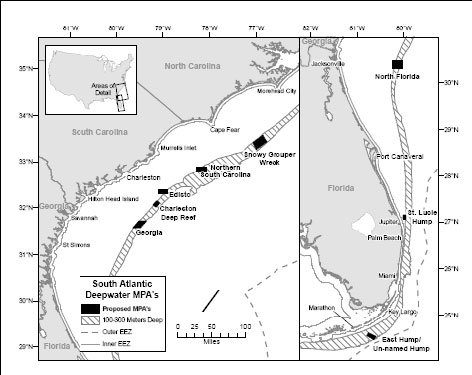
Four of the Proposed MPAs are off the S.C. Coast
Industry and fishery conservation groups learned in early January that the Department of Commerce’s National Oceanic and Atmospheric Administration (NOAA) National Marine Fisheries Service (NMFS) is preparing to announce the final rule creating eight marine protected areas (MPAs) off the coasts of North Carolina, South Carolina, Georgia and Florida.
Known as Amendment 14, the rule is a change to the federal South Atlantic Region’s Fishery Management Plan (FMP) for the snapper/grouper fishery. This ruling does not affect coastal waters under state jurisdiction.
Although the amendment will establish eight MPAs for the snapper/grouper fishery, the ruling itself does not ban sportfishing altogether, bottom fishing in the designated areas is prohibited. Trolling over the top is a permitted activity.
The ruling was prepared and submitted by the South Atlantic Fishery Management Council only after an extensive science-driven and transparent public process. The sportfishing community contributed to the decision making process over several years of deliberation and fact finding.
The MPAs are intended to protect a portion of the habitat of long-lived, slow-growing deepwater snapper and grouper from current fishing pressure within the proposed MPAs, while at the same time seeking to minimize the adverse social and economic effects on the sportfishing industry, recreational anglers and the coastal communities that benefit from marine fishing.
There is also a provision in the rule that allows for review and lifting of the restrictions if the data indicates that the fisheries goals have been met.
“Do we like restrictions on recreational fishing? Of course not: however, this was a deliberative and public process where all the known facts were laid on the table. In this case, the facts said that restricting access to the snapper/grouper fishery in certain designated areas was in the best interests of the fisheries and the communities and industries that depend on them and we support that,” said American Sportfishing Association President and CEO Mike Nussman. “For decades, the sportfishing industry and anglers themselves have supported efforts to improve our nation’s fisheries. These MPAs were created using a public process, driven by sound science, which took into account the economic and social impacts their creation will have in South Atlantic.”
“This is the way MPAs should be established,” said Jeff Crane, president of the Congressional Sportsmen’s Foundation. “This process brings together federal and state agencies, along with industry, academia and other groups in a process that balances the economic, social and recreational uses of the area under consideration with the needs of the fisheries and their supporting habitats. The regional fishery councils study, consider and propose changes to the FMPs using a governance system that will closely monitor and appropriately adjust any established areas over time.”
The South Atlantic MPAs range from 50 to 500 nautical square miles in size and range from nine to 30 nautical miles offshore. The sites were chosen on the basis of maximizing the biological benefits while minimizing the adverse social and economic effects.
“Sportsmen and women are the backbone of conservation in this country. For over a hundred years, anglers and hunters have adhered to seasons, bag limits and other management measures designed to sustain and improve our fish and wildlife resources,” said ASA Vice President Gordon Robertson. “We are encouraged that President-elect Obama recognizes this as reflected in remarks he’s made on the campaign trail and in recent interviews supporting public access to public lands and waters.”
“The thoughtful, thorough and transparent process leading up to this final rule is the collaborative way to reach the best decisions regarding our environment. Using other means, such as proclamations, subvert what should be an open process and don’t achieve a result that is in the best public interest for our public resources,” Robertson concluded.



Be the first to comment